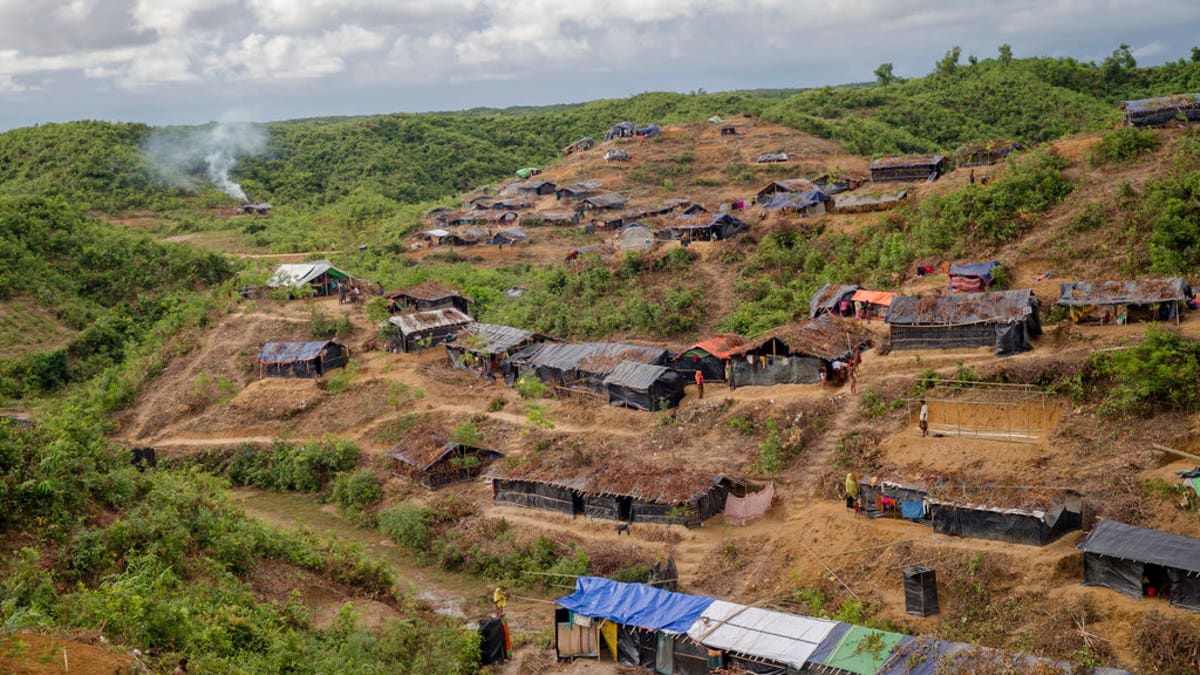
Tents cover a hillock at a refugee camp for Rohingya Muslims who crossed over from Myanmar into Bangladesh, in Taiy Khali, Bangladesh, Wednesday, Sept. 27, 2017. (AP Photo/Dar Yasin)
In Burma – the Asian country now called Myanmar by its ruling junta – a brutal military crackdown on the Rohingya minority has led to thousands of deaths and rapes. It has also led to the creation of the largest refugee camp in the world, with almost 1 million people.
This horror has received far too little media coverage, showing that even in our era of instant global communication atrocities can occur in hidden corners of the world. These cry out for exposure and action.
So why is the U.S. State Department even debating whether or not to use the term “genocide” to mark the one-year anniversary of the mass murder and other violence taking place in Burma?
The United Nations Convention on Genocide defines genocide as “acts committed with intent to destroy, in whole or in part, a national, ethnical, racial or religious group.” These acts include: “Killing … causing serious bodily or mental harm … deliberately inflicting on the group conditions of life calculated to bring about its physical destruction … imposing measures intended to prevent births … (and) forcibly transferring children.”
Independent observers all agree that the military leaders of Buddhist-majority Burma are committing genocide against the persecuted Rohingyas, a Muslim minority group.
Investigators commissioned by the State Department have assembled 15,000 pages of evidence of killings, gang rapes, villages set on fire and children tossed into rivers and fires.
The atrocities have only subsided in recent months because the vast majority of the Rohingyas – nearly 1 million people – have fled across the border into exile in neighboring Bangladesh, where they huddle in sweltering refugee camps.
Despite this record, the U.S. has so far avoided labeling what has taken place in Burma a “genocide.” Instead, our government prefers the term “ethnic cleansing,” which carries far less weight and makes it harder to impose sanctions on the responsible Burmese government officials.
In the debate over the content of an upcoming speech by Secretary of State Mike Pompeo on the Rohingya issue, it’s clear that the issue of whether or not to use the term “genocide” is a leading bone of contention.
A leaked draft of Pompeo’s remarks includes the bracketed phrase “hold for determination” in the part of the speech that describes what happened in Burma, Politico reported.
The U.S. has had an ambivalent relationship with Burma over the years. Along with the rest of the world, the U.S. welcomed news that the nation’s military rulers began liberalizing their rule a few years ago.
In 2016, dissident leader and Nobel Prize winner Aung San Suu-Kyi was released from house arrest and led her party to victory in elections that year. The Obama administration then lifted most sanctions on the country just before it left office.
But there was a catch. The military-written Burmese constitution cements its control over the armed forces, prevents Sun-Kyi from becoming president or prime minister, and gives the generals in dark glasses enough seats in parliament to prevent changes in the constitution.
Consequently, military leaders have with the assurance they needed to drive the hated Rohingyas out of the country. So far, the U.S. has responded by only issuing economic sanctions against a single Burmese general who actively led the repression.
The debate inside the Trump administration over what to do about Burma is tied up its concern that further sanctions will push the country’s military leaders to step up ties with China and cut the country’s new economic ties to the West.
State Department legal officials still aren’t convinced that the evidence the military fully planned the systematic repression of the Rohingyas is ironclad. Such concerns are understandable, but there is a history here that compels the U.S. government to take action.
A quarter century ago, the Clinton administration had to deal with reports that hundreds of thousands of Rwandans were being massacred in that country. Clinton administration officials studiously avoided using the term “genocide” to describe what happened, because as a then-secret memo said doing so might compel the U.S. to “actually ‘do something.’”
No one is asking or expecting the United States to intervene in Burma now. But it’s important that America not avoid uncomfortable or inconvenient language in describing the atrocities in Burma for what they are – genocide.
Sam Brownback, President Trump’s ambassador-at-large for religious freedom, put it best when he said: “We have to start calling it what it is. This is religious cleansing. It would not be happening were these people not Muslim. If they were Buddhists, in all likelihood this would not be happening today.”
The outcome of the battle over the language to be used in Secretary Pompeo’s speech on Myanmar will soon be revealed. For moral, humanitarian and even legal reasons it’s important the U.S. avoid “diplospeak” and properly label what has happened to the Rohingyas as genocide.
George Orwell, the author of the novel “1984,” long ago warned of how our thought and society itself is undermined when we debase the language and employ euphemisms. On the issue of what is going on in Burma, America must speak clearly, succinctly and with no ambiguity.




















